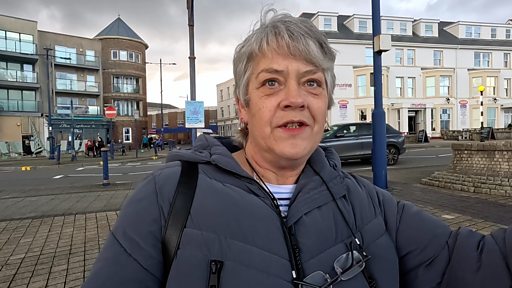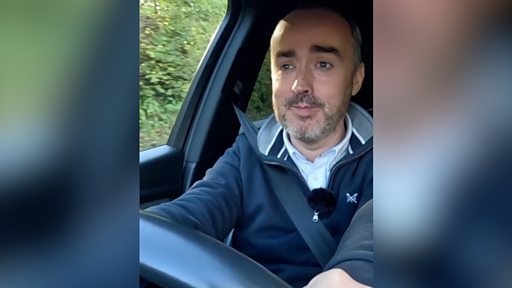20mph speed limit enforcement to start in Wales this month
- By Matt Murray and Peter Shuttleworth
- BBC News
6 January 2024
Updated 3 hours ago
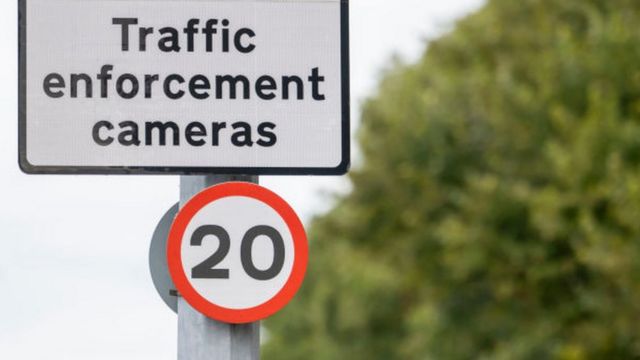
Image source, Getty Images
The new 20mph default speed limit in built-up areas in Wales will start to be enforced this month.
The Welsh government has confirmed the GBP34m law, which came into effect last September[1], will be enforced in January after the “initial bedding in period”.
But ministers have said not all drivers breaking the 20mph (32km/h) limit will initially be prosecuted, just the most dangerous offenders.
A motoring lawyer has said a lack of 20mph signs has confused some drivers.
Enforcement will start from Monday, and roadside teams will use speed monitoring equipment to catch offending motorists.
They will be stopped and given a choice between a fine and points, or roadside engagement.
“Following the introduction of the new default 20mph speed limit in September 2023, there was an initial bedding in period to give people time to adapt to the change,” said a Welsh government spokesperson.
In September, Wales became the first UK nation to lower speed limits in residential areas from 30mph to 20mph.
Ministers said they wanted to reduce deaths, noise and pollution and encourage people to walk or cycle.
Why the confusion around 20mph?
The Welsh government law has caused controversy with some drivers and opposition politicians and there has been uncertainty around its enforcement.
Other reports suggested enforcement began on 17 December.
To play this content, please enable JavaScript, or try a different browser
But Wales’ road safety body – made up of police, council and government officials – said no enforcement had been made in new 20mph stretches, unless at police officers’ discretion.
However, prosecutions were reintroduced in long-standing 20mph zones in November.
Now Go Safe will start roadside engagement in some of Wales’ new 20mph areas from Monday as part of Operation Ugain[2].
But the government warned the most dangerous drivers will not be eligible for an engagement session and will be prosecuted.
“We intend to engage the public in it and explain the change in the law and take enforcement action only when necessary,” South Wales Police Chief Constable Jeremy Vaughan told the BBC last month.
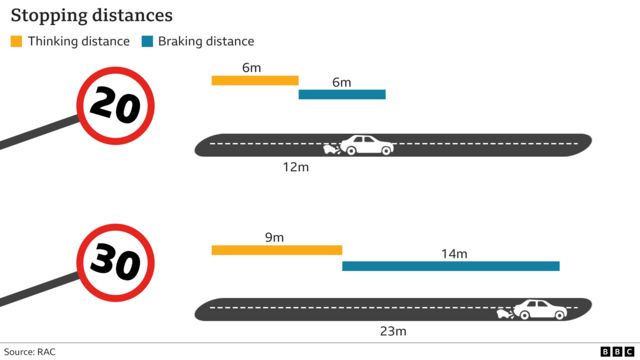
North Wales Police said enforcement sites would be approved where the data, including speed compliance statistics, showed there would “be a road safety benefit from enforcing”.
“Our aim is to ensure compliance with the speed limits for the benefit of road safety, not to catch people out,” a spokesperson told the Wrexham Leader[3].
How is 20mph being enforced?
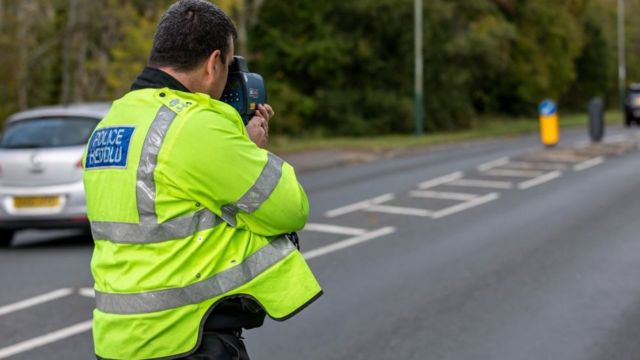
Image source, Getty Images
Go Safe said if data showed speeding continuing on a specific stretch of 20mph road, authorities would step up preventative action, like extra roadside engagement operations, speed calming measures or more speed cameras.
They also said fixed speed cameras, installed where collision risk is highest, would be adjusted to the new speed and there would be enforcement if there was evidence of “low compliance with the new limit”.
Drivers caught doing 26mph or more on those new 20mph stretches by speed cameras will be prosecuted.
This means the enforcement threshold advice from the National Police Chiefs’ Council[4], which sets guidance for UK officers, is 10% plus 4mph – rather than the usual 10% plus 2mph which applies in other speed limit areas.
The speed limit reduction to 20mph in residential areas affects 35% of Welsh roads where lamp-posts are no more than 200 yards (183m) apart – but drivers have been reassured they will not be punished if the road signs are wrong and still show the old speed limit.
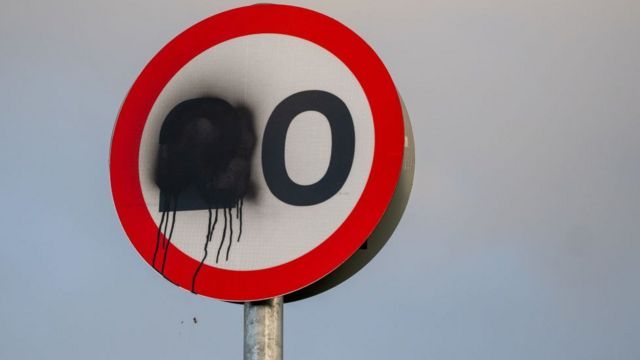
Image source, Getty Images
“The speed limit sign must be clear otherwise the motorist has a potential challenge to any offence,” said specialist motoring law solicitor Jon Wilkins.
Police said paying to attend a speed awareness course – and avoiding points on your driving licence – would be possible for drivers caught breaking the new limit, but it had not been decided at what speed this could be an option.
“This adds to the confusion as if the police don’t fully appreciate what they may or may not be doing in certain circumstances, how can this be enforced?” added Mr Wilkins.
To play this content, please enable JavaScript, or try a different browser
“Another confusion that if a case proceeds to court, the magistrates court guidelines for England and Wales suggest that if you’re caught doing 31mph in a 20mph zone, the starting point the magistrates should consider is a seven to 28 day disqualification from driving along with a fine.
“So a confused motorist who is genuinely mistaken to what the speed limit might be faces a seven to 28 day disqualification – and those guidelines have not been changed.”
Police chiefs are expected to meet again this month to further discuss enforcement but Mr Wilkins, a partner of Reeds Solicitors in Cardiff, said “significant confusion” among motorists on some stretches of road should be “addressed” before prosecutions start.
“There are clients of mine that have raised issues around signage and there’s confusion whether certain roads are 20, 30 or even 40mph,” he added.
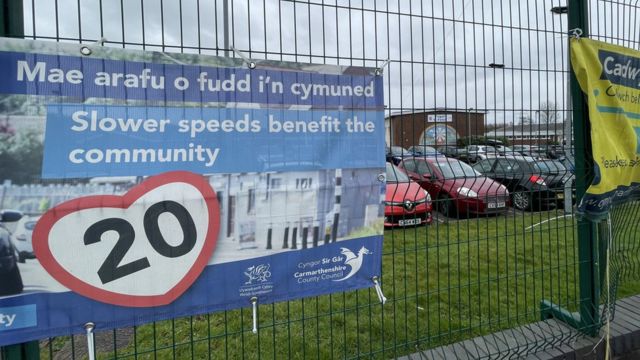
“That level of confusion could be mitigated by a significant and longer period of engagement, such as speaking to motorists and formal warnings.”
Jeremy Miles and Vaughan Gething, the two candidates to succeed Mr Drakeford as Welsh Labour leader, have said they want a review[5] of the policy.
But Mr Miles ruled out a U-turn[6] on the 20mph law, adding that he believed it was “the right policy”.
“The opportunity which the review brings is to understand whether more guidance needs to be given so that councils know what the discretions are that they can exercise within the context of a national framework,” he said.
References
- ^ came into effect last September (www.bbc.co.uk)
- ^ Operation Ugain (www.gosafe.org)
- ^ told the Wrexham Leader (www.leaderlive.co.uk)
- ^ National Police Chiefs’ Council (www.npcc.police.uk)
- ^ said they want a review (www.bbc.co.uk)
- ^ ruled out a U-turn (www.bbc.co.uk)
